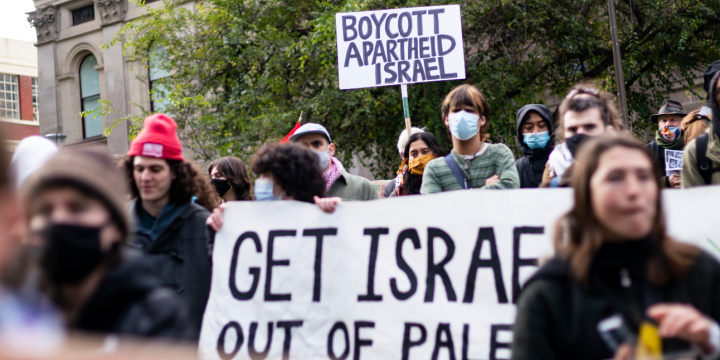 Australian Government Bows to Far-Left Pressure on Israel
Australian Government Bows to Far-Left Pressure on Israel
Natalie Ecanow and David May
 Anti-Israel protestors in Melbourne, Australia, c. 2021. Photo: Matt Hrkac/Wikimedia Commons.
Anti-Israel protestors in Melbourne, Australia, c. 2021. Photo: Matt Hrkac/Wikimedia Commons.
Earlier this month, Australia upended nearly a decade of precedent when the government announced that it will start referring to the West Bank, eastern Jerusalem, and Gaza as “occupied Palestinian territories” rather than “disputed” lands.
The Australian government claims it is “advancing the cause of peace,” but how this move advances peace is not readily apparent. The change simply accepts the Palestinian framing of a key issue at a time when the Palestinian Authority (PA) can barely control the West Bank, let alone negotiate with Israel.
In 2014, Australia’s then-Attorney General George Brandis explained that the government would stop using the term “occupied” because it is mistaken to “describe areas of negotiation in such judgmental language.”
He said that the word is “freighted with pejorative implications which is neither appropriate nor useful.” Instead, the government opted for the term “disputed,” which more accurately describes the legal status of the territories.
Since the end of the British Mandate in 1948, no government has exercised undisputed sovereignty over the West Bank, Gaza, or eastern Jerusalem. Jordan conquered the territories during Israel’s war of independence, but few countries recognized Jordan’s claim. When Israel won control of the lands in the Six-Day War, it did not claim sovereignty. The Palestinians now claim the rights to govern these territories, but according to the Oslo Accords that created the PA, negotiations with Israel must first resolve the land’s status.
Australian policy reflected this until August 8, when Canberra flipped the script. Foreign Minister Penny Wong announced the change, and even described the Gaza Strip as occupied, despite the withdrawal of all Israeli forces and residents in 2005.
Wong represents the Australian Labor Party (ALP), which secured a majority in Australia’s May 2022 elections. Her announcement regarding the territories came less than two weeks before the ALP’s national conference, which began in Brisbane on August 17.
The timing is not coincidental. Reportedly, ALP leaders were at odds with the far left over “two foreign policy matters” in the run-up to the conference: the Israeli-Palestinian conflict, and a nuclear-powered submarine deal that the previous government negotiated with the United States and United Kingdom.
The ALP split the difference. The party reportedly “tor[e] down one of those foreign policy pillars, which is support for Israel, to preserve the other.” A spokesperson for the opposition told the press that the change in policy has “everything to do with managing factional differences” and “nothing to do with advancing a lasting two-state outcome.”
Australia has been an ally of Israel for decades; the two enjoyed particularly close ties under Australia’s previous government. In February 2022, for example, then Prime Minister Scott Morrison rejected an Amnesty International report that wrongly accused Israel of “apartheid.” Wong herself said the accusation was “not helpful in progressing the meaningful dialogue and negotiation necessary to achieve a just and enduring peace.”
But under ALP rule, Australia’s Israel policy has started to backslide. In October 2022, the government reversed Morrison’s decision to recognize western Jerusalem as the capital of Israel. And this year, Australia signed two joint statements with other Western governments condemning Israeli settlement construction in the West Bank.
Wong insisted last week that the government in Canberra remains a “committed friend of Israel.” She defended the decision to adopt the term “Occupied Palestinian Territories” as a move consistent with United Nations and European Union practice.
Thankfully, ALP has yet to lead Canberra completely off the deep end. Last October, a United Nations Commission of Inquiry (COI) investigating the Israeli-Palestinian conflict “set forth grounds to conclude” that Israel’s presence in the West Bank is “now unlawful under international law.” Two months later, the United Nations General Assembly passed a resolution requesting that the ICJ issue an advisory opinion echoing the COI’s finding. Australia voted against the resolution — justifiably.
Israel’s West Bank presence is the result of a defensive war it won in 1967. Having tried and failed multiple times to negotiate a “land for peace” agreement, the Palestinian leadership has consistently rebuffed Israel’s terms. The Israelis have thus sustained their presence in these disputed territories.
Facts notwithstanding, the ICJ appears poised to rule against Israel and advise that international law requires Israel’s swift and unilateral withdrawal from the West Bank. A bipartisan group of American lawmakers warned that such an outcome “would almost certainly be used to further the propaganda assault and the Boycott, Divestment, and Sanctions (BDS) movement against Israel while simultaneously undermining the credibility and effectiveness of UN human rights bodies.”
Fifteen judges sit on the ICJ, including one from Australia. And while ICJ judges are independent, their decisions often reflect the priorities of their home countries. The first round of submissions in the ICJ proceedings were due on July 25. Australia did not file, and is thus precluded from direct intervention in the proceedings. But in the wake of its misguided shift in language, the ALP government can still redeem itself. It should make clear that Australia stands by Israel amidst an ongoing delegitimization campaign. A clear public statement in support of Israel would carry weight with the court, and help steer Australia’s policy back in the right direction.
Natalie Ecanow is a research analyst at the Foundation for Defense of Democracies (FDD), where David May is a research manager. FDD is a non-partisan research institute in Washington, DC, focusing on national security and foreign policy. Follow FDD on Twitter @FDD.
Zawartość publikowanych artykułów i materiałów nie reprezentuje poglądów ani opinii Reunion’68,
ani też webmastera Blogu Reunion’68, chyba ze jest to wyraźnie zaznaczone.
Twoje uwagi, linki, własne artykuły lub wiadomości prześlij na adres:
webmaster@reunion68.com
